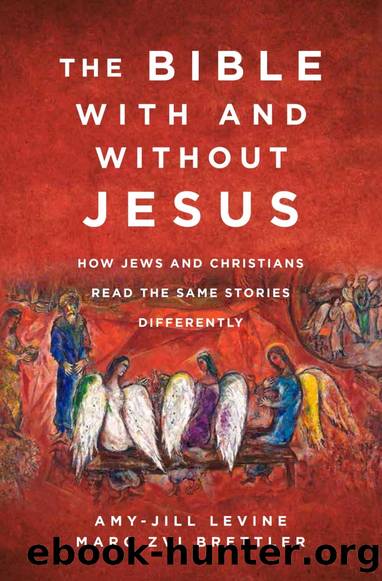The Bible With and Without Jesus: How Jews and Christians Read the Same Stories Differently by Amy-Jill Levine

Author:Amy-Jill Levine [Levine, Amy-Jill]
Language: eng
Format: epub
ISBN: 9780062560155
Amazon: 0062560158
Barnesnoble: 0062560158
Goodreads: 51179799
Publisher: HarperOne
Published: 2020-08-24T00:00:00+00:00
From Prediction to Polemic
ALTHOUGH IN the New Testament only Matthewâs Gospel cites Isaiah 7:14, later authors deployed the verse in their arguments against non-Messianic Jews as well as other Jesus-followers whose Christology they found deficient. The next extant textual citation of Isaiah 7:14 in relation to Jesus appears in Justin Martyrâs Dialogue with Trypho (ca. 160). Justin, who lived circa 100â165, was born in Samaria to pagan parents. He was one of Christianityâs foremost apologists, who sought to show the Roman Empire that Christianity was not a subversive or depraved sect but a philosophically logical and ethically moral movement. He gained the title âmartyrâ when he and his disciples refused to renounce their faith.
In the Dialogue, Justin and Trypho discuss what have remained major issues in Jewish-Christian conversation: the ongoing value of the covenant with Moses, supersessionism, the messianic identity of Jesus in relation to Israelâs scriptures, the relation of Trinitarian thought to Jewish monotheism, the role of the Logos, and the distinctive wordings of the Hebrew scriptures versus their Greek translations. While speculation that the Dialogueâs Trypho is based on Rabbi Tarfon, an early second-century companion of the famous Rabbi Akiva, cannot be confirmed, James E. Kiefer aptly observes that the dialogue was âprobably a real conversation with a real rabbi (although it may be suspected that Justin in editing it later gave himself a few good lines that he wished he had thought of at the time), whom he met while promenading at Ephesus shortly after the sack of Jerusalem in 135.â12 Given that the emperor Hadrian, by destroying the city, ended hopes that the Temple destroyed by Roman troops in 70 CE would be rebuilt, the followers of Jesus became increasingly convinced that Godâs covenant had passed from the Jews to them.
In Dialogue 67, Trypho and Justin turn to the question of Jesusâs conception. Trypho, as expected, states that Isaiah describes not a âvirginâ but a âyoung womanâ and adds, âBut the whole prophecy refers to Hezekiah and it is proved that it was fulfilled in him, according to the terms of this prophecy.â13 As we have seen, his dating for the birth of Hezekiah is off. Trypho nevertheless quotes the Hebrew correctly.
Trypho goes on to cite some miraculous-birth stories from what we today would call âGreek mythologyâ: âIt is written that Perseus was begotten of Danae, who was a virgin; he who was called among them Zeus having descended on her in the form of a golden shower. And you ought to feel ashamed when you make assertions similar to theirs⦠. But do not venture to tell monstrous phenomena, lest you be convicted of talking foolishly like the Greeks.â Justin had to guard the front on the pagan side, a front that saw Jesus as just another god, like Hercules or Mithra, Dionysius or Pythagoras. Placing the mythological examples on Tryphoâs lips, Justin is able to deny the charge that Christians were copying pagan stories. He goes on to insist rather that all the competing accounts of miraculous births were the work of Satan.
Download
This site does not store any files on its server. We only index and link to content provided by other sites. Please contact the content providers to delete copyright contents if any and email us, we'll remove relevant links or contents immediately.
| Haggadah | Hasidism |
| History | Holidays |
| Jewish Life | Kabbalah & Mysticism |
| Law | Movements |
| Prayerbooks | Sacred Writings |
| Sermons | Theology |
| Women & Judaism |
The Power of Habit by Charles Duhigg(3129)
Man's Search for Meaning by Viktor E. Frankl(2669)
Mckeown, Greg - Essentialism: The Disciplined Pursuit of Less by Mckeown Greg(2440)
MOSES THE EGYPTIAN by Jan Assmann(2412)
Devil, The by Almond Philip C(2325)
The Complete Dead Sea Scrolls in English (7th Edition) (Penguin Classics) by Geza Vermes(2277)
Unbound by Arlene Stein(2268)
I Capture the Castle by Dodie Smith(2034)
Schindler's Ark by Thomas Keneally(1879)
The Invisible Wall by Harry Bernstein(1799)
The Gnostic Gospel of St. Thomas by Tau Malachi(1793)
The Bible Doesn't Say That by Dr. Joel M. Hoffman(1677)
The Secret Doctrine of the Kabbalah by Leonora Leet(1607)
Political Theology by Carl Schmitt(1577)
The Jewish State by Theodor Herzl(1533)
A History of the Jews by Max I. Dimont(1529)
The Dead Sea Scrolls Bible by Martin G. Abegg(1513)
The Book of Separation by Tova Mirvis(1485)
Oy!: The Ultimate Book of Jewish Jokes by David Minkoff(1369)
